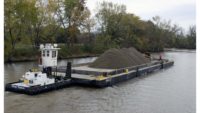The Infrastructure Act Rollout
EPA Allocates $1B in New Federal Funds for Superfund Projects
Update: EPA finalizing plans to start construction "as soon as possible"

The U.S. Environmental Protection Agency has announced plans to spend $1 billion from the new federal infrastructure law to eliminate its backlog of unfunded Superfund sites around the country and speed cleanup of other hazardous-waste sites where work is already underway.
The plan, which EPA unveiled on Dec. 17, includes funds to start construction at 49 sites in 24 states and territories that are on the Superfund National Priorities List and constitute the program’s funding backlog.
EPA Administrator Michael Regan (pictured, above) said some projects awaited federal dollars for more than five years. “This funding will clear the backlog of cleanup projects that has been growing since 2015,” he said.
Regan said the 49 projects “are the first wave of projects that will help deliver lasting public health protections in communities that need them the most, with about 60% in communities classified as underserved.
The $1 billion also represents the first installment of $3.5 billion provided for Superfund cleanups in the Infrastructure Investment and Jobs Act, which was enacted on Nov. 15.
EPA said in a statement emailed to ENR that the agency "is preparing funding mechanisms and finalizing cleanup plans to get construction work started as soon as possible."
The agency added, "We don't have a timeline that we're able to share at the moment, but more information about funding for backlogged sites and accelerated cleanup sites will be available in the coming weeks."
Seven of the 49 sites on EPA's construction list are in New Jersey—which has more total Superfund locations than any other state—five in Florida, four each in Michigan and North Carolina and three in New York and Tennessee.
Regan announced the funding news at the Lower Darby Creek Superfund site in Philadelphia. He said that project is one where the added funding will speed up completion.
EPA said another project to be accelerated is the North Penn 6 Superfund site in Lansdale, Pa., which will receive about $3.6 million to excavate for offsite removal contaminated soils.
Beside providing the $3.5 billion in funding, the law also reinstated a tax on chemical products that will help pay for Superfund cleanups that will take effect on July 1, 2022. It went into effect in 1980 and expired on Dec. 31, 1995.




